新目标九年级英语Unit 14 Have you packed yet Sectin A课件
- 格式:ppt
- 大小:8.46 MB
- 文档页数:53
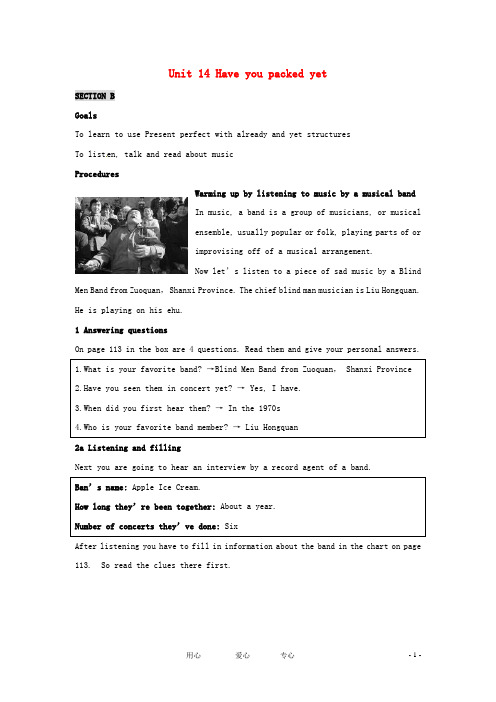
Unit 14 Have you packed yetSECTION BGoalsTo learn to use Present perfect with already and yet structuresTo list en, talk and read about musicProceduresWarming up by listening to music by a musical bandIn music, a band is a group of musicians, or musicalensemble, usually popular or folk, playing parts of orimprovising off of a musical arrangement.Now let’s listen to a piece of sad music by a Blind Men Band from Zuoquan, Shanxi Province. The chief blind man musician is Liu Hongquan. He is playing on his ehu.1 Answering questionsOn page 113 in the box are 4 questions. Read them and give your personal answers.2a Listening and fillingNext you are going to hear an interview by a record agent of a band.After listening you have to fill in information about the band in the chart on page 113. So read the clues there first.2b Listening and checkingWhat are the things that the band has already done? Now listen to the recording and check the items in the box on page 113.Finally you are supposed to read the tapescript. While readinglook for examples of “Present perfect with already and yet”2c Doing pairworkWhat is your favorite band? Now in pairs ask and answerquestions about it?Have they been on TV?Yes, they have. Their music videos have even been shown to the public on3a Reading, circling and underliningOn page 114 is an article about the New Ocean Waves! Read it!already done, and underline the ones they haven’t done yet.You are supposed to read the article once again. This time look for and blacken all the expressions.3b Completing a reviewOn page 114 is an unfinished review about Apple Ice Cream. Read it and co mplete it using information from 2b, with as many “ Present perfect with already and yet” structures as possible.3c Writing about a bandWhat’s your favorite band?Now write a review of the band you like best.known as a jazz orchestra, is a large4 Doing groupworkIn groups of four ask questions to find out answers to the survey in the chart on page 114.Have you everld Chinese coins last year.Have you everClosing down by listening jazz musicA jazz band is a musical ensemble that plays jazz music. Jazz bands usually consist of a rhythm section and a horn section.The rhythm section of a jazz band consists of the drums, bass, and usually at least one instrument capable of playing chords, such as a piano or guitar. The rhythm section is the foundation for the band; it sets the feel for the piece. The horn section consists of wind instruments, which play the melody and main accompaniment. Typical horns found in a big jazz band include 4 trumpets, saxophones (2 altos, 2 tenors, and a baritone), and 4 trombones and a bass trombone. The saxophones may also double on flute and clarinet and the trumpets on flugelhorn.SELF CHECK1 Filling blanksTo test our learning of grammar, let’s go to page 115. First we do the test number 1, filling in the blanks.2. Reading and listingOn page 115 in the middle on the left is a conversation between Sue and Jerry. Read it and make a list of things Jerry has done, and the things he has not done.plant sJust for fun!Read the song words and listen to the song called:《Moon river》Moon river wider than a mileI'm crossing you in style some dayOld dream maker, your heart breakerWherever you're goingI'm going your wayTwo drifters off to see the worldThere's such a lot of world to seeWe're after the same rainbow's endWaiting round the bendMy huckleberry friendsMoon river and meReading: He’s already visited the place where his ancestors lived.Before you read, listen to the recording, for the forms and for th e meanings.While you the “ Present perfect with already and yet” structure, underline the expressions and blacken the connectives.yochangesPart 2: Teaching Resources (第二部分:教学资源)I. What is music?Music is the art of making sound by human voice or special musical instruments like violin, oboe, trumpet, drum and so on.In music, sounds are arranged in time to give a pleasing result. There are many different kinds of music.Music is written using note symbols on a staff, which is a group of horizontal lines. The line which a note is written on shows what pitch it is. The notes are separated into measures using vertical lines on the staff.II. What is a song?A song is a piece of music which has words in. Old Macdonald had a Farm is a song.Songs can be made in many ways. Some people form bands which write and record songs to make money from it. Other songs are folk songs, which are songs created by people long ago and have been sung as tradition in many countries. Some people also make parodies of songs, which is changing the words of t he song but keeping the tune. Parodies are usually made to make fun of a song or it's writer/singer.III. Origins and CharacteristicsChinese music can be traced back as far as the third millennium B.C. Manuscripts and instruments from the early periods of its history are not extant, however, because in 212 B.C., Shih Huang-ti of the Ch'in dynasty caused all the books and instruments to be destroyed and the practice of music to be stopped. Certain outlines of ancient Chinese music have nevertheless been ascertained. Of primary significance is the fact that the music and philoso phy of China have always been inseparably bound; musical theory and form have been invariably symbolic in nature and remarkably stable through the ages. Ancient Chinese hymns were slow and solemn and were accompanied by very large orchestras. Chamber music was also highly developed. Chinese opera originated in the 14th cent. as a serious and refined art.。
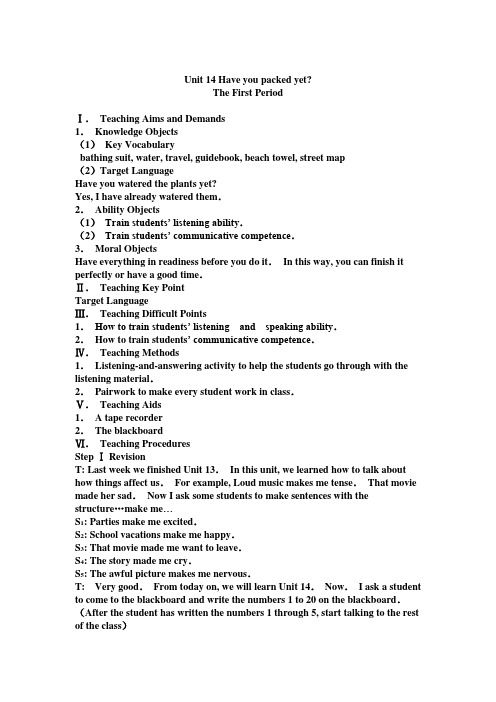
Unit 14 Have you packed yet?The First PeriodⅠ.Teaching Aims and Demands1.Knowledge Objects(1)Key Vocabularybathing suit, water, travel, guidebook, beach towel, street map(2)Target LanguageHave you watered the plants yet?Yes, I have already watered them.2.Ability Objects(1)Train students’ listening ability.(2)Train students’ communicative competence.3.Moral ObjectsHave everything in readiness before you do it.In this way, you can finish it perfectly or have a good time.Ⅱ.Teaching Key PointTarget LanguageⅢ.Teaching Difficult Points1.How to train students’ listening and speaking ability.2.How to train students’ communicative competence.Ⅳ.Teaching Methods1.Listening-and-answering activity to help the students go through with the listening material.2.Pairwork to make every student work in class.Ⅴ.Teaching Aids1.A tape recorder2.The blackboardⅥ.Teaching ProceduresStep Ⅰ RevisionT: Last week we finished Unit 13.In this unit, we learned how to talk about how things affect us.For example, Loud music makes me tense.That movie made her sad.Now I ask some students to make sentences with the structure…make me…S1: Parties make me excited.S2: School vacations make me happy.S3: That movie made me want to leave.S4: The story made me cry.S5: The awful picture makes me nervous.T: Very good.From today on, we will learn Unit 14.Now.I ask a student to come to the blackboard and write the numbers 1 to 20 on the blackboard.(After the student has written the numbers 1 through 5, start talking to the rest of the class)T: Has he written the number 1 yet?Class repeat the question.Has he written the number 1 yet?S s: Has he written the number 1 yet?T: (Pointing to the number 1 on the board)Yes, he has already written the number 1.Class repeat.Yes, he has already written the number 1.S s: Yes, he has already written the number 1.T: (Writing the word already on the blackboard)This is the word already.Class repeat.Already.Look at the blackboard.(pointing to the blackboard)Has he written the number 50 yet? Class repeat the question.Has he written the number 50 yet?S s: Has he written the number 50 yet?T: (Pointing to the highest number already on the blackboard)No, he hasn’t written the number 50 yet.Class repeat.No, he hasn’t written the number 50 yet.S s: No, he hasn’t written the number 50 yet.T: (Writing the word yet on the blackboard)Tish is the word yet.Class repeat.Yet.Now, look at the two words already and yet.Which one is used to talk about things that have happened in the past?SSs: Already.T: Yeah.Very good.So the other word yet is used to talk about things that will happen in the future.Yeah?SS: Yes.Step Ⅱ 1aThis activity introduces key vocabulary and helps students review vocabulary they already know.Read the instructions aloud to the class.Say, Who can give an example of a beach vacation and sightseeing in a city? Ask a student to give the example.(bathing suit, travel guidebook)Get students to add some things to the lists under the two headings.A beach vacation and Sightseeing in a city.Have students do the work individually first.While they are working, walk around the classroom checking the progress of the students.Let students tell the class the words they wrote.Write the words on the blackboard.Read them and let students repeat.Then ask other students to add other words to the lists.Sample answersA beach vacation 1.bathing suit 2.beach towel 3.sunglasses Sightseeing in a city travel guidebook street map cameraStep Ⅲ 1bThis activity gives students practice in understanding the target language in spoken conversation.Look at the picture.Ask, What can you see in the picture? (There is a family in the picture.They are getting ready for a beach vacation)Point to the box.Invite a pair of students to read the conversation to the class.A: Have you packed the beach towels yet?B: No, I haven’t.Look at the six chores on the list.Let students read each item, then ask different students to explain the meaning of each item in their own words.Make sure students understand the meaning of each item.Go through the instructions with the class.Point to the blank lines in front of each item in the list.Say, You will hear a family talking as they get ready to go on vacation.Listen carefully.Make sure what the family talks about and put a checkmark in front of each chore that is already done.Play the tape.The first time students only listen.Play the tape a second time.Now listen to the tape again.This time please put your checkmarks on the correct blanks.Check the answers with the whole class.Answers√ packed the camera√ watered the plantslocked the windows√ bought a travel guidebookbought a street mappacked the beach towelsTapescriptWoman: Have you packed the beach towels yet?Boy: No, I haven’t.Can’t Judy pack them?Woman: No, she’s busy.Could you please water the plants?Boy: I’ve alread y watered them.Woman: Oh, thanks.Man: What about the travel guidebook and the street map?Woman: I’ve already bought the travel guidebook, but I haven’t got the street map yet.Man: That’s OK.I’ll get it.Have you packed the camera?Boy: Yes.I’ve alrea dy put it in my suitcase.Woman: Well, I guess that’s everything.Boy: Almost everything.We haven’t locked the windows yet.Step Ⅳ 1cThis activity provides guided oral practice using the target language.Go through the instructions with the whole class.Look at the example in the box.Invite a pair of students to read it to the class.S A: Have you watered the plants yet?S B: Yes, I have already watered them.Tell students they will be making conversations with a partner.Look back at the chores in Activity lb.Say, Now look back at the chores in Activity lb.Make conversations talking about what the family members have already done andwhat they haven’t done yet, using words from the chores, such as packed the camera, locked the windows, bought a street map.While students are working in pairs, walk around the classroom and listen to some pairs.If necessary, offer language support.Then get several pairs of students to say their conversations to the class.Conversation 1S A: Have they packed the camera yet?S B: Yes, they have already packed the camera.Conversation 2S A: Have they bought a street map yet?S B: No, they haven’t bought a street map yet.NotesHave you watered the plants yet?Yes, I have already watered them: PresentPerfect Tense.The structure is have+ p.p.Pay attention to the two words already and yet.Already is used in affirmative sentences; while yet is used in negative and interrogative sentences.Do some exercises about Present Perfect TenseStep Ⅴ SummaryIn this class, we’ve learn ed some important words, such as water, travel, guidebook, beach towel.We’ve also learned the target language.Have you watered the plants yet? Yes, I have already watered them.Step Ⅵ HomeworkMake conversations in pairs to review the target language.Step Ⅶ Blackboard Design。
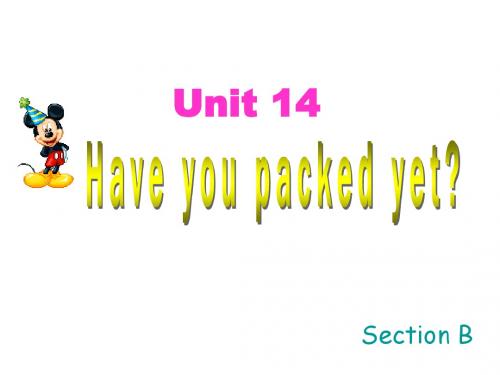
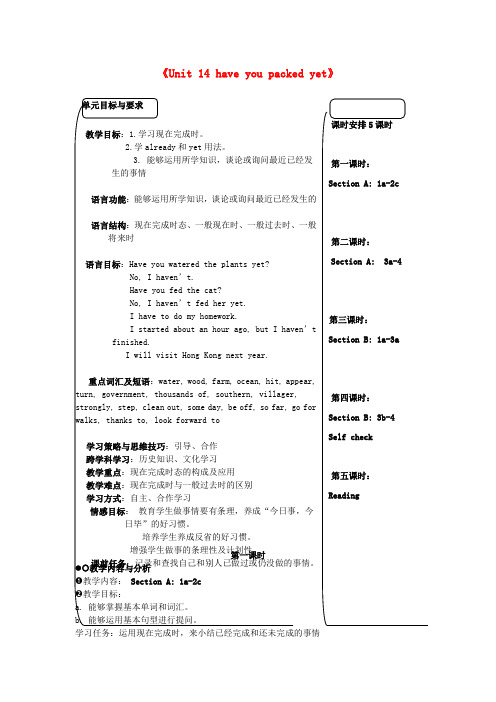
《Unit 14 have you packed yet 》学习任务:运用现在完成时,来小结已经完成和还未完成的事情目的:通过学生小组活动,询问或谈论已经完成和还未完成的事情。
学会使用 already 和yet, 并能在实际情境中简单地运用,培养学生应用英语进行交际的能力。
语言技能:listening .speaking .reading and writing语言知识:现在完成时的用法提示词语及句型:watered, travel guidebook, suitcase, beach towel, bathing suit, refrigerator, member, cleaned out, turned off,Have you watered the plants yet? Yes, I have already watered them?Have you packed the camera yet? Yes, I have already packed the camera.●教学重点、难点分析:❶教学重点:基本单词,词汇和句型❷教学难点:能够运用现在完成时谈论自己的已经完成和还未完成的事情●课前准备❶本课时的教学课件●教学设计出门旅游应该注意什么?Yes, I have already fou nd it?alrea dy第二课时●教学内容与分析:❶教学内容:Section A: 3a-4❷教学目标:1.能进一步用所学的目标语言谈论现实生活中已经发生的事情。
2.能理解3a的内容,并完成相应的练习。
●教学重难点:❶本课重点是掌握并进一步巩固第一课时的句型,要求学生能应用他们在实际情景中自如运用。
❷重点词语及句型:chop, wood, light, village, well, farmHave you bought a newspaper?Yes, I've already bought a newspaper.●课前准备:❶本课时的教学课件。
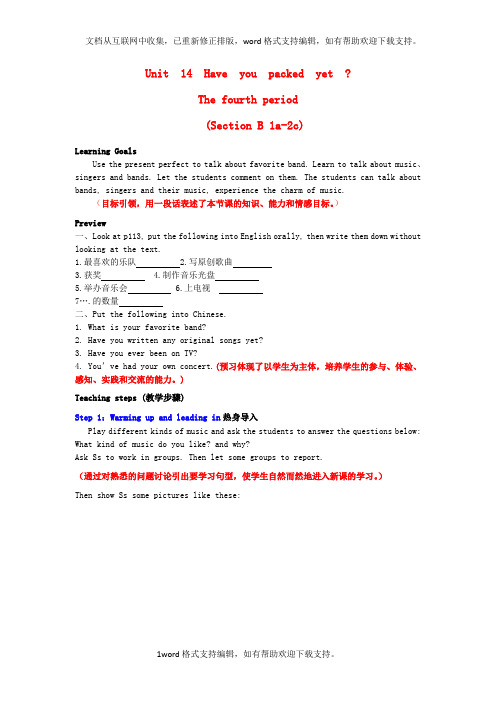
Unit 14 Have you packed yet ?The fourth period(Section B 1a-2c)Learning GoalsUse the present perfect to talk about favorite band. Learn to talk about music、singers and bands. Let the students comment on them. The students can talk about bands, singers and their music, experience the charm of music.(目标引领,用一段话表述了本节课的知识、能力和情感目标。
)Preview一、Look at p113, put the following into English orally, then write them down without looking at the text.1.最喜欢的乐队2.写原创歌曲3.获奖4.制作音乐光盘5.举办音乐会6.上电视7….的数量二、Put the following into Chinese.1. What is your favorite band?2. Have you written any original songs yet?3. Have you ever been on TV?4. You’ve had your own concert.(预习体现了以学生为主体,培养学生的参与、体验、感知、实践和交流的能力。
)Teaching steps (教学步骤)Step 1:Warming up and leading in热身导入Play different kinds of music and ask the students to answer the questions below: What kind of music do you like? and why?Ask Ss to work in groups. Then let some groups to report.(通过对熟悉的问题讨论引出要学习句型,使学生自然而然地进入新课的学习。

Unit 14 Have you packed yet1.bathing n.游泳;洗澡[]n.游泳, 洗海水澡2.suit n.衣服;服装[]v.合适, 适合, 相配, 合式, 适宜于n.一套衣服3.towel n. 手巾;毛巾[]n.手巾, 毛巾v.用毛巾擦4.water v. 浇灌;浇水[]n.水, 雨水, 海水, 水位, 水面, 流体vt.喷淋, 供以水, 注入水, 使湿vi.流泪, 加水adj.水的, 水上的, 水生的, 含水的above water-Out of difficulty or trouble.摆脱困难,摆脱麻烦water under the bridge-A past occurrence, especially something unfortunate, that cannot be undone or rectified:既成事实:过去发生的事情,尤指不幸之事且不可改变或无法挽回:All that is now just water under the bridge.所有那些现在都是不可改变的既成事实in deep water(s)陷入困境(= into deep water(s))in hot water遇到麻烦;处于困境(= into hot water)like water大量地;无节制地The wine flowed like water.把酒像水一样地大量喝下去。
make water小便(= pass water)hold water滴水不漏;合情合理Your story just doesn't hold water.你说的不合情理。
throw cold water泼冷水water on the brain 脑部水肿water on the knee膝部水肿5.guidebook n.旅行手册;指南6.clean out 清除;打扫干净[]n.旅行指南,指南,手册,便览7.refrigerator n.冰箱[]n.电冰箱, 冷藏库8.garage n.汽车库;汽车间[]n.汽车间, 修车厂, 车库v.放入车库9.suitcase n.(旅行用)小提箱;衣箱[]n.手提箱, 衣箱10.chop v.砍[]n.砍, 排骨, 官印, 商标vt. (chopped, chopping)剁碎, 砍, (风浪)突变get the chop解雇;撤职chop and change时常改变(主意、计划等)chop logic诡辩;强词夺理地争辩down in the chops神色沮丧, 垂头丧气first chop[口]头等, 一流get the chop[俚]被杀死; 被取消get the chopper[俚]被杀死; 被取消lick one's chops舐嘴唇, 馋涎欲滴; [美俚]幸灾乐祸no chop[口]很差, 没有价值not much chop[口]算不了什么, 没什么了不起chop about乱砍(树木等)(风)突变方向, 突变变化chop and change变化无常, 摇摆不定chop at向...砍去, 打chop away切掉, 割去chop back急忙倒退; 急忙掉转方向chop down砍倒, 砍掉, 切去chop off砍倒, 砍掉, 切去chop away砍倒, 砍掉, 切去chop fine 切细chop in插嘴, 多嘴chop into切成chop logic强词夺理chop off切开, 切断, 切去chop out(地层等)突然露出[喻]割断(历史等)chop up(地层等)突然露出[喻]割断(历史等)chop round风突变11.wood n.木头;木材[]n.木头, 木材, 树木cannot [fail to] see the wood for the trees见树不见林;只见细节不见全面beat the woods入丛林中驱出猎物Don't halloo[cry]till you are out of the wood.[谚]未出险境别先欢呼。
SECTION BGoalsTo learn to use Present perfect with already and yet structuresTo listen, talk and read about musicProceduresWarming up by listening to music by a musical bandIn music, a band is a group of musicians, or musicalensemble, usually popular or folk, playing parts of orimprovising off of a musical arrangement.Now let’s listen to a piece of sad music by a Blind Men Band from Zuoquan, Shanxi Province. The chief blind man musician is Liu Hongquan. He is playing on his ehu.1 Answering questionsOn page 113 in the box are 4 questions. Read them and give your personal answers.2a Listening and fillingNext you are going to hear an interview by a record agent of a band.After listening you have to fill in information about the band in the chart on page 113. So read the clues there first.2b Listening and checkingWhat are the things that the band has already done? Now listen to the recording and check the items in the box on page 113.Finally you are supposed to read the tapescript. While readinglook for examples of “Present perfect with already and yet”2c Doing pairworkWhat is your favorite band? Now in pairs ask and answer questions about it?3a Reading, circling and underliningOn page 114 is an article about the New Ocean Waves! Read it!already done, and underline the ones they haven’t done yet.You are supposed to read the article once again. This time look for and blacken all the expressions.3b Completing a reviewOn page 114 is an unfinished review about Apple Ice Cream. Read it and complete it using information from 2b, with as many “ Present perfect with already and yet” structures as possible.3c Writing about a bandWhat’s your favorite band?Now write a review of the band you like best.4 Doing groupworkIn groups of four ask questions to find out answers to the survey in the chart on page 114.Closing down by listening jazz musicA jazz band is a musical ensemble that plays jazz music. Jazz bands usually consist of a rhythm section and a horn section.The rhythm section of a jazz band consists of the drums, bass, and usually at least one instrument capable of playing chords, such as a piano or guitar. The rhythm section is the foundation for the band; it sets the feel for the piece. The horn section consists of wind instruments, which play the melody and main accompaniment. Typical horns found in a big jazz band include 4 trumpets, saxophones (2 altos, 2 tenors, and a baritone), and 4 trombones and a bass trombone. The saxophones may also double on flute and clarinet and the trumpets on flugelhorn.SELF CHECK1 Filling blanksTo test our learning of grammar, let’s go to page 115. First we do the test number 1, filling in the blanks.2. Reading and listingOn page 115 in the middle on the left is a conversation between Sue and Jerry. Read it and make a list of things Jerry has done, and the things he has not done.Just for fun!Read the song words and listen to the song called:《Moon river》Moon river wider than a mileI'm crossing you in style some dayOld dream maker, your heart breakerWherever you're goingI'm going your wayTwo drifters off to see the worldThere's such a lot of world to seeWe're after the same rainbow's endWaiting round the bendMy huckleberry friendsMoon river and meReading: He’s already visited the place where his ancestors lived.Before you read, listen to the recording, for the forms and for the meanings.While you the “ Present perfect with already and yet” structure, underline the expressions and blacken the connectives.Part 2: Teaching Resources (第二部分:教学资源)I. What is music?Music is the art of making sound by human voice or special musical instruments like violin, oboe, trumpet, drum and so on.In music, sounds are arranged in time to give a pleasing result. There are many different kinds of music.Music is written using note symbols on a staff, which is a group of horizontal lines. The line which a note is written on shows what pitch it is. The notes are separated into measures using vertical lines on the staff.II. What is a song?A song is a piece of music which has words in. Old Macdonald had a Farm is a song.Songs can be made in many ways. Some people form bands which write and record songs to make money from it. Other songs are folk songs, which are songs created by people long ago and have been sung as tradition in many countries. Some people also make parodies of songs, which is changing the words of the song but keeping the tune. Parodies are usually made to make fun of a song or it's writer/singer.III. Origins and CharacteristicsChinese music can be traced back as far as the third millennium B.C. Manuscripts and instruments from the early periods of its history are not extant, however, because in 212 B.C., Shih Huang-ti of the Ch'in dynasty caused all the books and instruments to be destroyed and the practice of music to be stopped. Certain outlines of ancient Chinese music have nevertheless been ascertained. Of primary significance is the fact that the music and philosophy of China have always been inseparably bound; musical theory and form have been invariably symbolic in nature and remarkably stable through the ages. Ancient Chinese hymns were slow and solemn and were accompanied by very large orchestras. Chamber music was also highly developed. Chinese opera originated in the 14th cent. as a serious and refined art.。